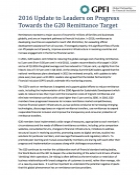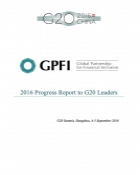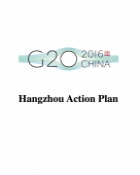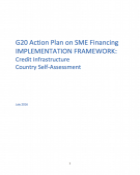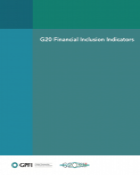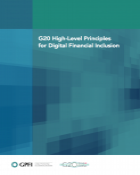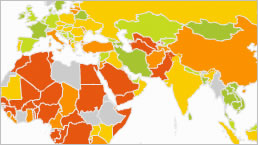Report | Nov 28, 2017
Remittances represent a major source of income for millions of families and businesses globally, and are an important pathway to financial inclusion. This report outlines G20 measures and progress to expand responsible financial inclusion and improve the transparency and consumer protection of remittance transfers.Learn more about the G20 National Remittance Plans.
Report | Sep 13, 2016
This report summarizes GPFI activities from December 2015 to July 2016, presents the main achievements under the Chinese Presidency and describes the outlook for the rest of 2016 and into the start of the German Presidency. References to all relevant documentation produced by the different workstreams are provided at the end of this report.
Report | Sep 13, 2016
The Hangzhou Action Plan explicitly recognizes the critical importance of financial inclusion to empowering the lives of the poor. Based on the G20 High-level Principles for Digital Financial Inclusion, G20 Leaders commit to taking “concrete actions” recommended by the Global Partnership for Financial Inclusion (GPFI) to promote digital financial inclusion, and help low-income developing countries (LIDCs) to reach the “last mile” of excluded and underserved groups.In addition, G20 Leaders welcomed “the first country self-assessment about to take place within the G20 Action Plan on SME Financing Implementation Framework”, and supported “the continued work of the GPFI to implement the G20 Financial Inclusion Action Plan (FIAP) and ask the GPFI to review the FIAP in 2017”. The Hangzhou Action
Report | Sep 16, 2016
Small and medium-sized enterprises (SMEs) play a crucial role for employment, job creation, investment, innovation and economic growth around the world. They account for about 90% of businesses and more than 50% of employment worldwide, and are therefore crucial for the recovery of the world’s economy. Considering this important role, it is critical to ensure that viable SMEs around the world have access to the credit they need to expand.
Lack of a sound credit infrastructure is one of the major problems in the credit market for SMEs. Having a solid credit infrastructure will help countries reduce the information asymmetries and legal uncertainties that increase risk to lenders and constrain the supply of finance to SMEs.
By endorsing the G20 Action Plan on SME Financing in 2015, the
Report | Aug 17, 2016
G20 leaders agreed at the Cannes Summit in 2011 to the GPFI recommendation to support global and national financial inclusion data efforts and subsequently endorsed the G20 Basic Set of financial inclusion indicators at the G20 Los Cabos Summit in 2012, born out of the work of the GPFI.
As committed at the time of the endorsement of the Basic Set, and in support of the key focus area of financial literacy under the Russian G20 Presidency, the GPFI expanded the indicators to cover the quality of financial service provisioning and consumption. With the support of China's G20 Presidency, the GPFI later revised the indicators to reflect the proliferation of digital financial services, including payments made through accounts, the internet, and mobile phones.
The updated G20 Financial
Report | Sep 16, 2016
The G20 stands at an unprecedented time when our leadership has the potential to drive the growth of inclusive economies by promoting digital financial services. Two billion adults globally do not have access to formal financial services and are excluded from opportunities to improve their lives. While tremendous gains in financial inclusion have already been achieved, digital financial services, together with effective supervision (which may be digitally enabled), are essential to close the remaining gaps in financial inclusion.
Digital technologies offer affordable ways for the financially excluded—the majority of whom are women—to save for school, make a payment, get a small business loan, send a remittance, or buy insurance.
The 2010 G20 Principles for Innovative Financial
| Apr 20, 2017
This is the 2016 Work Plan for the GPFI SME Finance Subgroup.Consistent with the theme of China’s G20 Presidency in 2016, “Towards the Innovative, Invigorated, Interconnected and Inclusive World Economy”, the GPFI SME Finance Subgroup will work on the implementation of the G20 Financial Inclusion Action Plan with particular focuses on the following Chinese Presidency Priorities in 2016:1. Digital Financial Inclusion: Innovation, Regulation and Supervision;2. Data and Indicators;3. Reaching the Last Mile: Rural Areas, the Poor, the Youth and the Elderly; 4. Financial Consumer Protection and Financial Literacy;5. SME Finance: Diversified Financing Channels.The Subgroup will also continue to work on its continued working agenda under the former Presidencies’ specifically on the following
| Apr 19, 2017
This is the 2016 Work Plan of the GPFI Regulation and Standard-Setting Bodies (SSBs) Subgroup.The 2016 Work Plan of the GPFI Regulation and SSBs Subgroup is organized around the Objectives (Activities) and Sub-objectives included in the Subgroup’s May 2014 Terms of Reference (see Appendix 1). It takes into consideration also the expected results under the GPFI Financial Inclusion Action Plan (FIAP) (see Appendix 2) and the related indicators in the results framework included in the Subgroup’s Terms of Reference (see Appendix 3). In addition, reference is made throughout to the numbered Recommendations from Part VI of second edition of the GPFI White Paper Global Standard-Setting Bodes and Financial Inclusion – The Evolving Landscape, released as a Consultation Document in November 2015 and
| Apr 20, 2017
This is the 2016 Work Plan for the GPFI Markets and Payment Systems Subgroup.The overall goal of the Subgroup is to advance utilisation of payment systems including remittances in the pursuit of increased and sustainable financial inclusion. The Subgroup will focus on emerging technologies and business models and will incorporate strong links to market based approaches through engagement with financial service providers. The Subgroup responds to the call in the G20’s St. Petersburg Development Outlook for the GPFI to explore in 2014 “targeted actions to harness emerging mechanisms such as electronic payments and mobile technology that can significantly improve access”.
| Apr 20, 2017
This is the 2016 Work Plan for the GPFI Financial Consumer Protection and Financial Literacy Subgroup.The objective of the FCPFL Subgroup for the next five years is to build the capacity of developing and emerging economies to implement audience-appropriate, evidence-based financial consumer protection and financial literacy programs. Additionally, the Subgroup will identify best practices, emanating from the public, private, and NGO sectors, in consumer protection and financial education policies that support use of digital financial products and services. The Subgroup will continue its efforts, consistent with the G20’s 2013 St. Petersburg Development Outlook, to increase incentives, financial education, financial literacy, and consumer protection for the poor, with emphasis on


